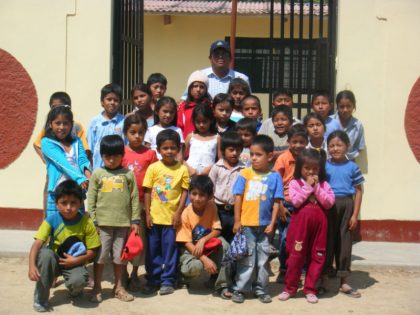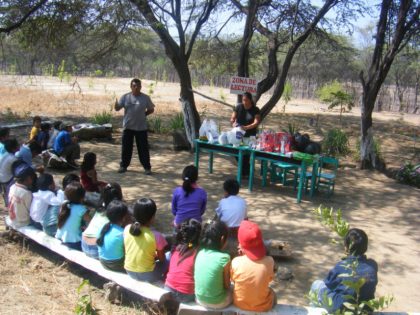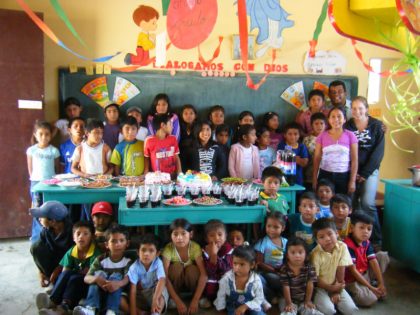 Location
Location
Caserío Alita, district of Salas, department of Lambayeque, Perú
Community Description
Caserío Alita is a small agricultural community. The population is approximately 250 people, dispersed throughout the area. Almost every family lives near their farm or the pastureland for their animals (goats, sheep, cows, etc.). Corn and beans are the two most important crops although a few families also raise fruit trees.
Caserío Alita is approximately 10 kilometers from the district capital of Salas but the travel is difficult. The community is two kilometers from the main road and there are no cars, taxis or other forms of public transportation on that stretch of road. Also, most of the community members live another 2-5 kilometers from the entrance road.
There are no consistent paying jobs. Most community members are dedicated to the farm and work in the farms of other people for daily wages if work is available. Also, the district government occasionally offers short-term jobs (1-2 months) in the district capital. These jobs focus on cleaning up roadways, building irrigation ditches, and other public works.
 There is a primitive water system in the community, but it is not a constant or reliable water source. There is a reservoir in the nearby mountains and this water is distributed to the communities in the desert below. However, Caserío Alita is at the end of the line, and access is often cut off, sometimes for months at a time.
There is a primitive water system in the community, but it is not a constant or reliable water source. There is a reservoir in the nearby mountains and this water is distributed to the communities in the desert below. However, Caserío Alita is at the end of the line, and access is often cut off, sometimes for months at a time.
When there is no water in the pipes, the children of the school must take water from the school well. They use this water for hand-washing as well as to water the small plantation of fruit trees and the vegetable garden they have planted on the school grounds.
Currently, all water is treated using the SODIS system, which purifies water in 2- or 3-liter bottles, which are left on a corrugated roof and heated by the sun’s rays.
Electricity was recently installed in the community, opening new opportunities for development.
Project Description
This project is to install an electric water pump at the primary school. The pump will pump water from the school’s well into an above-ground tank. From the tank, the water can be used (through simple water pressure) to service hand-washing sinks and water the mini-orchard the school has in place.
 Currently, the water is taken out of the well with a rope and bucket system. The water in the well is 17 meters below ground. The water tank is about 5 meters from the well. A 1-inch, 1 horsepower pump will be purchased in the departmental capital of Chiclayo (2 hours from Salas) and will be used to pump the water to the tank.
Currently, the water is taken out of the well with a rope and bucket system. The water in the well is 17 meters below ground. The water tank is about 5 meters from the well. A 1-inch, 1 horsepower pump will be purchased in the departmental capital of Chiclayo (2 hours from Salas) and will be used to pump the water to the tank.
Piping will be installed to connect the water tank to the sinks that are already in place. Other piping will be installed to take the water from the tank to each of the trees of the plot. The water pressure from the tank and the incline of the terrain will take the water to the plants. The plot contains various species of fruit and forest trees including molle, algarrobo, lime, palta, mango, gauva, among others.
Project funds will be used to pay for the water pump and the necessary piping. The PTA (the school) and the community will be constructing the irrigation system (digging the necessary trenches to cover the pipes, placing the piping, etc.) and installing and securing the pump in the well.
The project is supported by the PTA of the primary school. Also the bee-keepers association supports this project as any increase in forestation can be seen as an advantage for the bees.
Project Impact
This project will benefit up to 200 community members. Included in this number are 28 children in the school (grades 1-6) from 21 families. In addition, the entire community uses the school as a central location for meetings. This includes meetings of the bee-keepers association, the water association, general community meetings, community parties and meetings the regional government occasionally calls with the community
Peace Corps Volunteer Directing Project
Erica Locher
Comments
This project provides a time- and water-efficient system for watering as well as a secure and constant source of water for hand-washing and an imminent dental health campaign.
The water from the well is not potable without purification. The SODIS system for purification is functional but time-consuming. It will be up to the community to come up with a follow-up project, but consideration could be given to implementing a more efficient water purification system.
Dollar Amount of Project
$450.00
Donations Collected to Date
$450.00
Dollar Amount Needed
This project has now been fully funded through the generosity of Ken Howells, of San Bernardino, California, USA, with the help of friends and family of PCV Erica Locher.
We encourage others to continue to donate using the Donate button below, and we will notify Peace Corps Volunteer Erica Locher of your donation. Additional funds will be used to fund the next project by Erica and/or those of her counterpart PCVs in Peru.
This project has been finished. To read about the conclusion of the project, CLICK HERE.